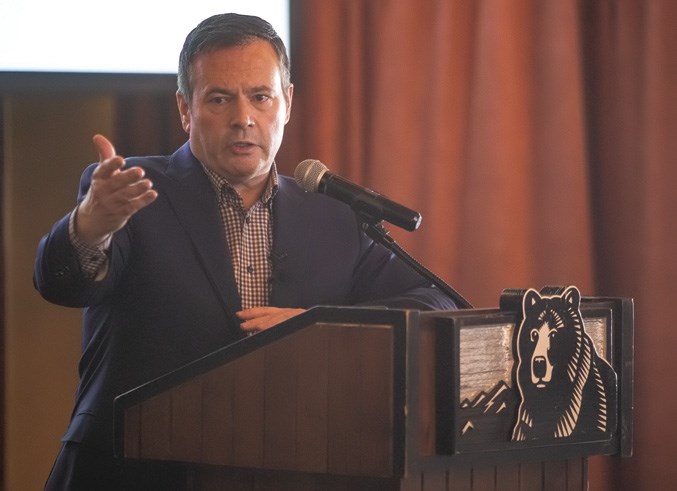CANMORE – If UCP leader Jason Kenney is elected he will introduce "common sense conservation" policies to expand and improve environmental protection throughout the province.
He released a 13-point conservation plan prior to speaking to the Bow Valley Builders and Developers Association in Canmore on Thursday (March 14).
"It's not a coincidence that conservatism and conservation are so similar," said Kenney, during a press conference with the media.
"Conservatives believe in conserving those things that are best, including our natural environment. We believe in our responsibility to future generations, not only to pass on important institutions and customs and an economy that is prosperous, but also a magnificent natural environment."
Under a UCP government, he said his party would introduce an Alberta Trails Act that would recognize the contribution trails play in enhancing the quality of life in the province. The act would encourage the sustainable use of trails as well as enhance and protect existing trails.
He also announced his government would increase funding by 50 per cent to the Alberta Land Trust Grant Program, an increase of $5 million to $15 million a year.
"Basically what this does is to help facilitate landowners, those who are often looking at retiring to help create conditions on the sale of that land to maintain its pristine nature," said Kenney.
"This is a wonderful private-public partnership for conservation in sensitive environmental areas."
He said his government would also maintain support for the Alberta Wetland Policy, the Watershed Resiliency and Restoration Program and the Alberta Land Stewardship Act.
During his announcement, he said his government would take a "balanced approach" to protect the environment by recognizing that recreation, economic use, and conservation can support each other.
"Unfortunately the NDP has taken an approach all too often that sets Albertans against one another using environmental policy as a wedge to divide people rather than common ground to unite them. We'll take a different approach because we don't believe that preservation of the natural environment, enjoying it through recreation and responsible economic usage are opposed to one another. We, in fact, believe they can support one another," said Kenney.
If elected he said his party will also focus on supporting local volunteer organizations that protect the province's natural environment such as the Alberta Riparian Protection Society to protect creeks and streams on the eastern slopes. He said his government would provide the organization with $1 million and ask the private sector to match that funding.
He said his government would also implement mandatory trail permit fees for off-highway vehicles (OHV) and camping trailers to create a dedicated fund to restore and create OHV trails, prevent damage and hire additional enforcement officers.
"This dedicated funding derived from an annual $30 per vehicle fee on camping trailers will also be directed to hiking and trail development, horse trails and other outdoor activities related to trails and trailheads," said Kenney.
"This will make off-highway vehicles and camping trailer owners partners with hunters and fishermen in self-funding protection and preservation in Alberta's great outdoors."
He also promised to review the Provincial Parks Act by conducting consultations with Albertans to modernize the act.
If elected, he said a UCP government would also increase base-line data collection for air, surface and groundwater quality, stream flow, forest health, fire risk, weather and air temperature, wildlife counts and other important measurements to better identify, track and support environmental outcomes.
In addition to better data collection, Kenney said he would also ensure more departmental staff with Alberta Environment and Parks are working outdoors with local stakeholders, rather than in their office.
"We would shift resources from pushing paper at desks in Edmonton to where the actual parks are and working with local stakeholder groups," said Kenney, adding his government would focus on strengthening partnerships with non-profit park societies.
"There are dozens of local charities and non-profits representing thousands of volunteers who do a lot of very important conservation and interpretation work in our provincial parks."
To support those groups, he said his government would provide $2 million over four years to launch a pilot project with the Friends of Fish Creek Provincial Park Society to try and expand the role of non-profit park societies.
During the press conference he also took time to emphasized that all major economic development proposals would continue to be subject to mandatory environmental impact assessments (EIA), however, his government wouldn't require an EIA if the federal government does.
"We won't do redundant environmental assessments, but we will continue to maintain protection of the environment as a major consideration in big economic projects," said Kenney.
On the flip side, he said all major environmental proposals will be subject to mandatory social-economic impact assessments.
"The reason for this is when an environmental assessment is done we need to make sure that we maintain that balance with recreation and economic use," said Kenney, pointing to plans by the current government to protect caribou in northern Alberta.
"Communities are very concerned that they will lose the basis of their livelihood in forestry and other industries if the government proceeds with its current plan."
He also said his government would encourage and increase the use of development credits for conservation.
"These are very useful policy instruments, which are underutilized in Alberta, so when a major development happens for example, and it might affect a local wetland, the provincial government can impose an obligation on that developer to do an offset by buying a credit to expand a wetland somewhere else in the province," said Kenney.
On that note, he said his government would also stop the illegal drainage of wetlands by creating a statutory law for adversely affected landowners downstream.
He said more details about the UCP's environmental plan, including its plans to control carbon emissions, will be released once the election is underway.




